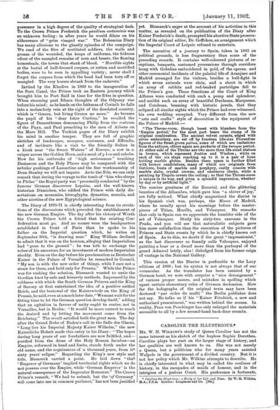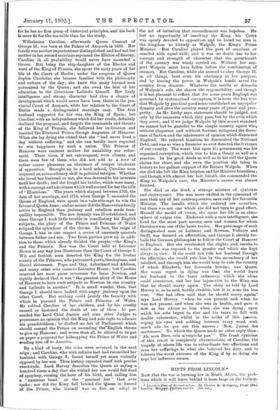CAROLINE THE ILLUSTRIOUS.*
Mn. W. H. WILKINS'S study of Queen Caroline has not the same interest as his sketch of the hapless Sophie Dorothea. Caroline plays her part on the larger stage of history, and her qualities are well known to us. She was not merely a Queen, but a politician who for many years assisted Walpole in the government of a divided country. But it is not her policy which Mr. Wilkins attempts to describe. He is chiefly interested in what may be called the coulisses of history, in the escapades of maids of honour, and in the intrigues of a jealous Court. His preference is fortunate, • Caroline the Illustrious : a Study of her Life and Tints. By W. H. Wilkins, F.S.A. London ; Longman and Co. [36s.] for he has no firm grasp of historical principles, and his book is more fit for the tea-table than for the study.
Wilhelmina Caroline, afterwards Queen Consort of George II., was born at the Palace of .Anspach in 1683. - Her family was neither important nor distinguished, and had not her mother in her second marriage espoused the Elector of Saxony, Caroline in all probability would never have ascended a throne. But being the step-daughter of the Elector and ward of the King of Prussia, she spent the early years of her life at the Court of Berlin ; under the auspices of Queen Sophie Charlotte, she became familiar with the philosophy and culture of the day; she knew the many learned men patronised by the Queen ; and she owed the best of her education to the illustrious Leibnitz himself. Her lively intelligence and strong character had thus a chance of development which would never have been theirs in the pro- vincial Court of Anspach, while her relation to the Court of Berlin made a distinguished marriage easy. The first husband suggested for her was the King of Spain; but Caroline, with an independence which did her credit, definitely declined the proposal, and despite the commands and threats of the King of Prussia, she followed her inclination and married the Electoral Prince George Augustus of Hanover. When she lay dying she owned that she " had never lived a day without suffering," and she can hardly have expected to win happiness by such a union. The Princes of Hanover were eminent neither for amiability nor refine- ment. Their vices, if not extravagant, were clumsy, and there were few of them who did not add to a love of rather coarse pleasures an obstinacy of temper intolerant of opposition. Brought up in a hard school,- Caroline soon acquired an extraordinary skill in political intrigue. Whether she loved her husband or not, she was devoted to his interests until her death ; and she fought his battles, which were many, with a courage and adroitness which well earned for her the title of "Illustrious." The years which elapsed between 1705, the date of her marriage, and 1714, when George I. ascended the throne of England, were spent in a vain attempt to win the favour of Queen .Axine ; amino sooner did the Hanoverian family arrive in England than jealousy and rebellion made tran- quillity impossible. The new dynasty was ill-established, and since George I. took little trouble in conciliating his English subjects, the glory of the Prince and Princess of Wales eclipsed the splendour of the throne. In fact, the reign of George L was in one respect a series of unseemly quarrels between father and son. Two fresh parties grew up in addi- tion to those which already divided the people,—the King's and the Prince's. Nor was the Court held at Leicester House in any way less illustrious than the Court of George I. Wit and fashion soon deserted the King for the livelier society of the Princess, who patronised poets, theologians, and liberal statesmen. Pope and Gay, Arbuthnot and Addison, and many other wits came to Leicester House; but Caroline reserved her most pious reverence for Isaac Newton, and rightly declared that it was " the greatest glory of the House of Hanover to have such subjects as Newton in one country and Leibnitz in another." It is small wonder, then, that George I. should have looked with angry jealousy upon the other Court. But nothing could justify the ferocity with wliich he pursued the Prince and Princess of Wales. He robbed Caroline of her children, and by his cruelty caused or hastened the death of one of them ; he per- suaded the Lord Chief Justice and nine other Judges to pronounce an opinion that the King had sole right to educate his grandchildren; he drafted an Act of Parliament which should compel the Prince on ascending the-English throne to give up Hanover ; and worse than all, he allowed to be put on paper a proposal for kidnapping the Prince of Wales and sending him off to America.
By a kind of irony, the rules were reversed in the next reign ; and Caroline, who with infinite tact had reconciled her husband with George I., found herself yet more violently opposed by her son. Thus history repeated itself with precise exactitude. Lord Hervey describes the Queen as saying a hundred times a day that she wished her son would fall dead of apoplexy, cursing the hour of his birth, and calling him a "nauseous beast" or the " greatest liar " that ever spoke ; nor did the King fall behind the Queen in hatred of the Prince, who himself was so fine an adept in the art of irritation that reconcilement was hopeless. He lost no opportunity of insulting the King, his Court was openly devoted to opposition, and he hated no man in the kingdom so bitterly as Walpole, the King's Prime. Minister. But Caroline played the part of assailant or assailed with equal skill; and it was no doubt due to her- courage and strength of character that the government of the country was wisely carried on. Without her sup- port Walpole must have fallen before the combination of enemies. But Caroline, while she seemed to obey George II. in all things, bent even his obstinacy to her purpose, and by leaving the power in Walpole's bands saved the country from disaster. Whatever the merits or defnerits of Walpole's rule, she shares the responsibility; and though it is not pleasant to reflect that for some years England was governed by systematised corruption, it is none the less true that Walpole by practical good sense established an unpopular dynasty and gave the country many years of peace and pros- perity. As Mr. Lecky says, statesmen should be judged, not only by the measures which they pass, but by the evils which they avert; and if we judge Walpole by this sound standard we cannot but be grateful to the simple country squire who, without eloquence and without fortune, mitigated the fierce- ness of faction and the intolerance of opinion which distracted England. He reduced taxation, he diminished the National Debt, and was as wise a financier as ever directed the fcrtunes of our country. The worst blot upon hi3 government was his organised corruption, which was to him a theory as well as a practice. In his good deeds as well as in his evil the Queen claims her share, and she owes the position she takes in history to her gallant support of Sir Robert Walpole. When she died she left the King helpless and his Minister friendless ;. and though with almost her last breath she commended the King to Walpole's care, the Minister's career was almost finished.
She died as she lived, a strange mixture of cynicism and clairvoyance. She was more skilled in the command of men than any of her contemporaries, save only her favourite Minister. The insults which she endured are countless, but there was not one which she did not turn to good effect. Herself the model of virtue, she spent her life in an atmo- sphere of vulgar vice. Endowed with a rare intelligence, she lived for the most part among men and women for whom literature was one of the baser trades. Her patronage of such distinguished men as Leibnitz and Newton, Voltaire and Swift, was deemed an affectation, and George I. sternly for- bade the German philosopher to follow the Court of Hanover to England. But she overlooked the slights and insults to which she was exposed to the greater end which she kept always in view. If she could not rule her husband through the affections, she would rule him by the ascendency of her intellect, and through him she would help to rule the country of which Elizabeth, her favourite heroine, was Queen. Her worst regret in dying was that she would leave her husband to the baser inflvencss which she alone could counteract, and her last injunction to the King was that he should marry again. The story as told by Lord Hervey is, as he said, hardly credible, but it is none the less true. "She bad often said that he should marry again," says Lord Hervey, " when he was present and when he was not present, and when she was in health, and gave it now as her advice to him when she was dying; upon which his sobs began to rise and his tears to fall with double vehemence, whilst in the midst of this passion, wiping his eyes and sobbing between every word, with much ado he got out this answer : ' Non, j'aurai des mattresses.' To which the Queen made no other reply than : Ah, mon Dieu. cela n'empeche pas. " The frank cynicism of this retort is completely characteristic of Caroline, the tragedy of whose life was to subordinate her affections and even her sufferings to what she believed her duty, and to tolerate the worst excesses of the King if by so doing she kept her influence secure.







































 Previous page
Previous page